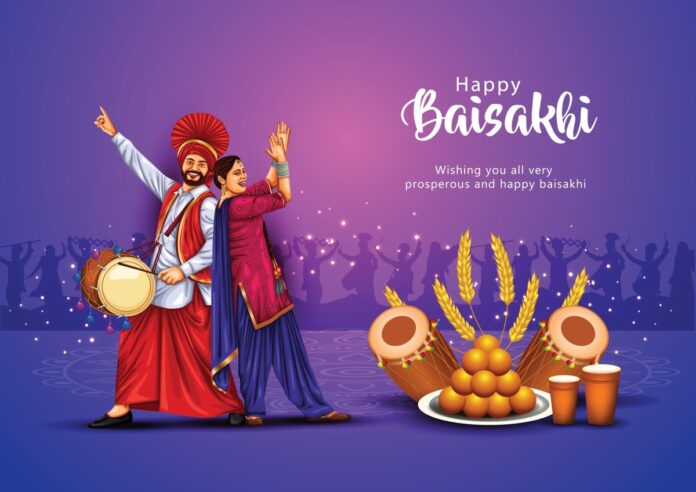Baisakhi 2024
Baisakhi, also known as Vaisakhi, is a significant festival celebrated in India, especially in the northern region, marking the beginning of the Sikh New Year and the harvest season. It holds immense cultural and religious significance for the Sikh community, as well as for Hindus in some parts of the country. Let’s delve into the history, meaning, date, and vibrant celebrations of Baisakhi in 2024.
Vaisakhi History
Vaisakhi, also known as Baisakhi, has a rich historical significance, especially in the Sikh tradition. The festival is celebrated on the first day of the month of Vaisakh in the Nanakshahi calendar, which corresponds to April 13 or 14 in the Gregorian calendar. Here is a brief overview of the historical events associated with Vaisakhi festival:
- Establishment of the Khalsa: The most significant event associated with Vaisakhi is the establishment of the Khalsa Panth by Guru Gobind Singh, the tenth Sikh Guru, in 1699. Guru Gobind Singh wanted to create a community of Sikhs who were willing to make the ultimate sacrifice for righteousness and justice. He called for a special gathering at Anandpur Sahib on the day of Vaisakhi and asked for a volunteer who would be willing to sacrifice their life for him. After a dramatic pause, Guru Gobind Singh emerged from a tent carrying a sword, demanding a head. One by one, five brave Sikhs came forward, known as the Panj Pyare, who offered their heads to Guru Gobind Singh. Guru Gobind Singh then baptised them with amrit (sweetened water stirred with a double-edged sword) and initiated them into the Khalsa brotherhood. This event is known as the Birth of the Khalsa and is celebrated with great fervor by Sikhs around the world.
- Harvest Festival: Vaisakhi is also celebrated as a harvest festival in Punjab and other parts of North India. It marks the beginning of the harvest season for wheat and other crops. Farmers thank God for the abundant harvest and pray for prosperity in the coming year.
- Historical Context: The historical context of Vaisakhi is rooted in the socio-political landscape of India in the late 17th century. Guru Gobind Singh’s establishment of the Khalsa was a response to the tyranny and oppression of the Mughal rulers, who were persecuting Sikhs and other non-Muslims. The Khalsa was envisioned as a community of saint-soldiers who would stand up against injustice and fight for the rights of all people, regardless of their religion or background.
- Symbolism: Vaisakhi holds profound symbolism in Sikhism. It represents the triumph of good over evil, the importance of selfless service, and the courage to stand up for one’s beliefs. The Khalsa is seen as the embodiment of these values, and Vaisakhi is a time for Sikhs to reflect on these teachings and renew their commitment to them.
Overall, Vaisakhi the Sikh festivak is a festival that celebrates the spirit of courage, sacrifice, and community service. It is a time for Sikhs to come together, pray, and celebrate the values that Guru Gobind Singh instilled in the Khalsa Panth.
Baisakhi Meaning
Linguistic Origin: The term “Baisakhi” is derived from the month of Vaisakh in the Indian calendar, which corresponds to April-May in the Gregorian calendar.
Harvest Festival: Baisakhi is primarily a harvest festival, celebrated to give thanks for a successful harvest and to pray for prosperity in the upcoming agricultural season.
Baisakhi 2024 Date
Baisakhi, also spelled as Vaisakhi, falls on the 13th of April in 2024, according to the Gregorian calendar. IBaisakhi will be celebrated with great enthusiasm and fervor across India, particularly in Punjab, Haryana, and parts of Himachal Pradesh.
Baisakhi Celebration in India
Baisakhi, also known as Vaisakhi, is celebrated with great enthusiasm and fervor in various parts of India, especially in Punjab, Haryana, and parts of Himachal Pradesh. The festival holds immense cultural and religious significance, marking the beginning of the Sikh New Year and the harvest season. Here is a glimpse into the vibrant celebrations of Baisakhi in India:
- Punjab: Baisakhi is celebrated as a major festival in Punjab, where it is known for its colorful and lively celebrations. People dress in traditional Punjabi attire, with men wearing kurta-pajamas and turbans, while women wear vibrant suits or salwar-kameez. The festival is marked by energetic bhangra and gidda performances, which are traditional Punjabi dances. These dances are performed by men and women, respectively, to the beat of the dhol, a traditional drum.
- Gurdwara Visits: Sikhs visit gurdwaras, the Sikh places of worship, to offer prayers and seek blessings. The Golden Temple in Amritsar is beautifully decorated on Baisakhi, attracting a large number of devotees and tourists. Special prayers are offered, and hymns are sung to commemorate the founding of the Khalsa Panth by Guru Gobind Singh.
- Processions: Colorful processions are taken out in various cities and towns, showcasing the rich culture and heritage of Punjab. These processions are accompanied by vibrant music, including traditional folk songs and devotional hymns. The atmosphere is festive, with people dancing, singing, and enjoying the festivities.
- Community Service: Baisakhi is also a time for community service, known as “seva” in Sikhism. Sikhs participate in various charitable activities, such as preparing and serving langar (community kitchen) meals to the needy. This act of selfless service is an important part of Sikh tradition and is done to express gratitude and compassion towards others.
- Fairs and Melas: Baisakhi fairs are organized in many places, offering a variety of handicrafts, traditional foods, and cultural performances. These fairs are a major attraction for both locals and tourists, providing a glimpse into Punjabi culture and tradition.
- Traditional Food: Special Baisakhi dishes are prepared on Baisakhi, including sarson da saag (mustard greens) and makki di roti (cornbread), which are traditional Punjabi delicacies. Other popular dishes include chole bhature, aloo puri, and various sweets like jalebi, gulab jamun, and kheer.
In conclusion, the Baisakhi festival is a joyous festival that not only celebrates the harvest season but also commemorates the founding of the Khalsa Panth. If you’re planning a trip for Baisakhi, AbhiBus be your go-to platform for booking bus tickets hassle-free. With AbhiBus, you can conveniently browse and select from a wide range of bus operators and routes, ensuring you find the perfect journey for your Baisakhi celebration. Say goodbye to long queues and uncertainty – AbhiBus provides real-time updates on bus schedules and availability, allowing you to plan your trip with ease. Whether you’re traveling solo or with family and friends, AbhiBus ensures a safe and comfortable journey, making your Baisakhi celebrations truly memorable.
FAQs
What is Baisakhi festival?
Baisakhi, also known as Vaisakhi, is a vibrant festival celebrated in India, especially in Punjab and other northern states. It marks the beginning of the Sikh New Year and the harvest season.
Why is Baisakhi celebrated?
Baisakhi is celebrated to commemorate the establishment of the Khalsa Panth by Guru Gobind Singh, the tenth Sikh Guru, in 1699. It is also a harvest festival, where farmers give thanks for a successful harvest.
When is Baisakhi celebrated?
Baisakhi is celebrated on the 13th or 14th of April every year, according to the Nanakshahi calendar. In 2024, it falls on the 14th of April.
In which state is Baisakhi festival celebrated?
Baisakhi is primarily celebrated in the state of Punjab, as well as in Haryana and parts of Himachal Pradesh. It is also celebrated by Sikhs and Hindus in other parts of India.
What is the difference between Lohri and Baisakhi?
Lohri is a festival celebrated in January, marking the end of winter and the arrival of longer days. It is mainly celebrated in Punjab. Baisakhi, on the other hand, is celebrated in April, marking the Sikh New Year and the harvest season.
What is Kaal Baisakhi?
“Kaal Baisakhi” is a term used to refer to a rare weather phenomenon that occurs around the time of Baisakhi. It is characterized by sudden, extreme weather changes, such as heavy rains, thunderstorms, or hailstorms, which can impact agricultural activities.
What is Kaal Baisakhi associated with?
“Kaal Baisakhi” refers to a weather phenomenon associated with Baisakhi. It is characterized by sudden changes in weather, such as thunderstorms and dust storms, often occurring around the time of Baisakhi.
Who established the Khalsa Panth?
The Khalsa Panth was established by Guru Gobind Singh, the tenth Sikh Guru, on the day of Baisakhi in 1699. He baptized the first members of the Khalsa and initiated them into a new order of Sikhs known as the Khalsa.





